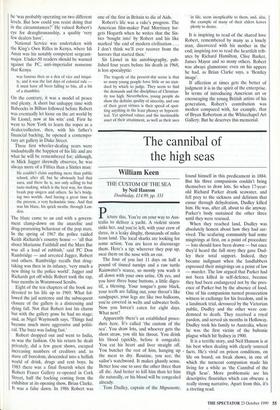The cannibal of the high seas
William Keen
THE CUSTOM OF THE SEA by Neil Hanson Doubleday, £14.99, pp. 331
Picture this. You're on your way to Aus- tralia to deliver a yacht. A violent storm sinks her, and you're left, with your crew of three, in a leaky dinghy, thousands of miles from land. The local sharks are looking for some action. You are keen to discourage them. Here's a tip: wherever they pop up, swat them on the nose with an oar.
The four of you last 11 days on half a pound of tinned turnips and a raw turtle Rainwater's scarce, so mostly you wash it all down with your own urine. Oh yes, and you have three bone buttons, a little diges- tif, a blessing. Your tongue's gone black, your teeth are falling out, your throat's like sandpaper, your legs are like two balloons, you're covered in welts and saltwater boils. Now you haven't eaten for eight days. What next?
Apparently there's an established proce- dure here. It's called 'the custom of the sea'. You draw lots, and whoever gets the short straw, you slit his throat. You drink his blood (quickly, before it congeals). You eat his heart and liver straight off. You butcher the rest of him, hanging up the meat to dry. Routine, you see; the sailor's watchword. It makes ghastly sense. Better lose one to save the other three than all die. And better to kill him than let him die naturally, or his blood will be congealed already.
Tom Dudley, captain of the Mignonette, found himself in this predicament in 1884. But his three companions couldn't bring themselves to draw lots. So when 17-year- old Richard Parker drank seawater, and fell prey to the sickness and delirium that ensue through dehydration, Dudley killed him. He was, after all, about to die anyway. Parker's body sustained the other three until they were rescued.
When they reached land, Dudley was absolutely honest about how they had sur- vived. The seafaring community had some misgivings at first, on a point of procedure — lots should have been drawn — but once they'd heard the full story they gave Dud- ley their total support. Indeed, they became indignant when the landlubbers expressed their misgivings on a point of law — murder. The law argued that Parker had not been killed in self-defence, because they had been endangered not by the pres- ence of Parker but by the absence of food. One of his companions turned prosecution witness in exchange for his freedom, and in a landmark trial, devoured by the Victorian public, Dudley and the other were con- demned to death. They received a royal pardon, and served six months in Holloway. Dudley took his family to Australia, where he was the first victim of the bubonic plague which hit Sydney in 1900.
It is a terrific story, and Neil Hanson is at his best when dealing with clearly sourced - facts. He's vivid on prison conditions, on life on board, on freak shows, in one of which the turncoat companion made his living for a while as 'the Cannibal of the High Seas'. More problematic are his descriptive flourishes which can obscure a really strong narrative. Apart from this, it's a riveting read.


















































































 Previous page
Previous page